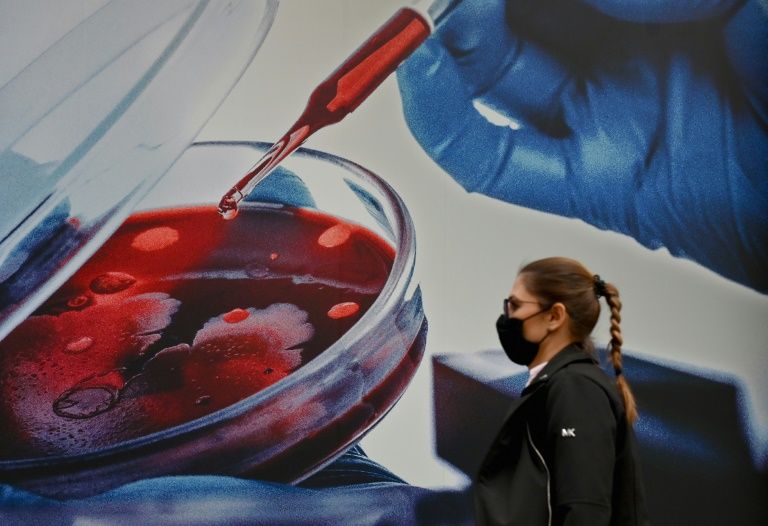Two vaccines hit snags as Pfizer nears US approval
Paris (AFP) – Two vaccine candidates stumbled Friday in the race among researchers to combat Covid-19, a setback for the global immunisation effort even as the Pfizer-BioNTech jab neared approval in the US.
The mixed news on the vaccine front comes as infections accelerated fast in North America and parts of Africa but started to stabilise in Europe and drop in Asia and the Middle East.
Around the world more than 1.58 million lives have been lost to Covid-19 since it emerged in China a year ago, according to an AFP tally from official sources.
While the record-fast development of vaccine options has brought hope to the planet, some candidates are suffering setbacks.
France’s Sanofi and Britain’s GSK said on Friday their vaccine would not be ready until the end of 2021.
New results showed a low immune response in older adults, researchers said.
And in Australia, the development of a vaccine in phase one trials at The University of Queensland was abandoned Friday after clinical trials produced a false positive HIV result among subjects involved in early-stage testing.
Yet inoculation plans with other vaccines are picking up pace.
In the US, an expert recommendation on Pfizer means the shot will likely receive official approval from the US Food and Drug Administration (FDA) in a matter of days.
President-elect Joe Biden hailed the “bright light in a needlessly dark time” in the US, which is home to the world’s highest death toll at nearly 300,000.
The country hopes to start vaccinating 20 million people this month, starting with long-term care facility residents and health workers.
– Sputnik mix –
Britain this week became the first Western country to roll out the Pfizer-BioNTech jab, which Canada, Bahrain and Saudi Arabia have also approved.
The first vaccine shipments to 14 sites across Canada are scheduled to arrive Monday with people receiving shots a day or two later.
“I’m really excited. I want to get vaccinated as soon as possible, because I have a new baby,” Michelle, a Toronto resident, told AFP.
Israel, which accepted its first shipment of the Pfizer vaccine on Wednesday, is targeting a rollout on December 27.
And Hong Kong said Friday it had struck deals for two vaccines — one from Pfizer and the other from Beijing-based Sinovac — with plans to launch a campaign in early 2021.
A new combined approach is also being tested by AstraZeneca, whose Russian operation said it would mix its shot with the locally-made Sputnik V vaccine in clinical trials.
“Combinations of different Covid-19 vaccines may be an important step in generating wider protection through a stronger immune response and better accessibility,” the pharma giant said in its statement.
Russia and China have already begun inoculation efforts with domestically produced vaccines that have seen less rigorous vetting, while EU countries are eagerly awaiting clearance on two options.
The EU’s watchdog said it would deliver decisions on the Pfizer and Moderna vaccines in late December and early January respectively.
Yet many lingering questions about the vaccines remain.
Key issues include whether more side effects will emerge with longer follow-up, how long the vaccine remains effective, whether it will limit transmission and how it will work in children, pregnant women, and immunocompromised patients.
– Carbon down –
As Europe’s surge eases off slightly, France is planning to lift a six-week-long lockdown from Tuesday but impose a curfew from 8 pm, including on New Year’s Eve.
Greece also announced new plans Friday to slash quarantine time for incoming travellers and reopen churches for Christmas, while some small shops such as hair salons and bookstores can open for business from Monday.
But Switzerland, which is seeing a sharp resurgence in cases, announced a 7pm curfew for shops, restaurants and bars.
“Our hospitals and our health workers are being stretched to the limit. We couldn’t wait any longer,” President Simonetta Sommaruga told a news conference in the capital Bern.
While lockdowns have brought economic pain, boredom and myriad other woes, the effect on the environment has been more positive.
Carbon emissions fell a record seven percent in 2020 as countries imposed lockdowns, according to the Global Carbon Project.
The biggest drops were recorded in the US, down 12 percent, and the European Union, down 11 percent.
And in the sporting world, Formula One world champion Lewis Hamilton was given the green light to return to racing at the season-ending Abu Dhabi Grand Prix after recovering from his own bout with the virus.
burs-ssm/har
Disclaimer: Validity of the above story is for 7 Days from original date of publishing. Source: AFP.


